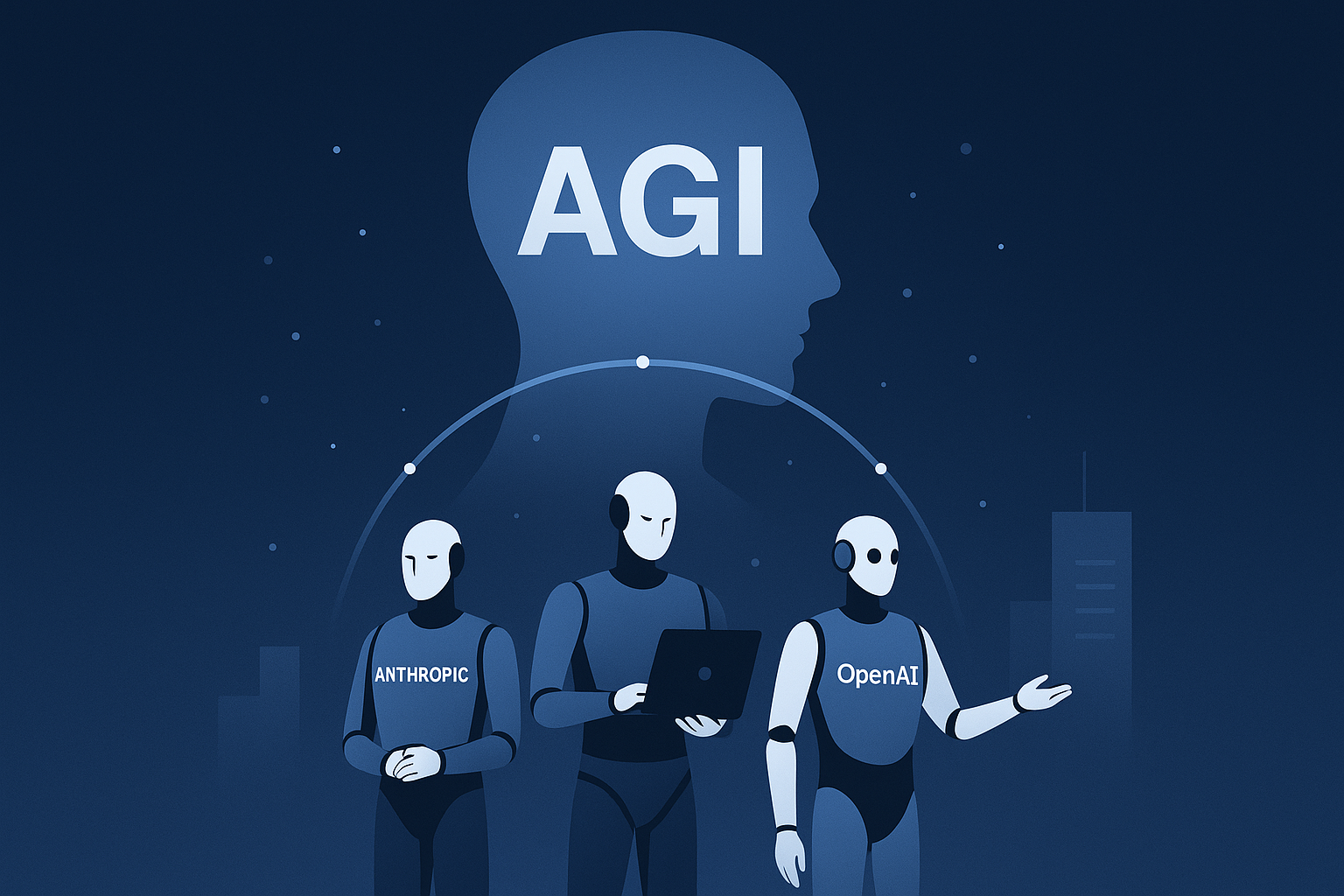The Dawn of the AI Agent Wars | 매거진에 참여하세요
The Dawn of the AI Agent Wars
#AI #Agent #War #Provider #BigTech #Competitio #AgentOps #MCP #AgentTeams
From answering to acting: how Claude, GPT, and Gemini are reshaping the AI battlefield
In 2025, AI in Silicon Valley no longer stops at giving answers.
The new frontier is about "acting" AI—autonomous agents that don't just respond but take initiative, use tools, and collaborate like teams.
We’re witnessing the early architecture of Artificial General Intelligence (AGI) emerge—not through one supermodel, but through networks of intelligent agents.
And the three giants—OpenAI, Anthropic, and Google DeepMind—are each betting on a different blueprint.
The Five-Stage Roadmap Toward AGI
Most experts agree that AGI won’t arrive in one leap. It evolves gradually across five stages:
- Single-task agents
automate repetitive jobs like email filtering or summarization
- Multi-task agents
chain tools together for continuous workflows
- Collaborative agent systems
assign specialized roles to multiple agents, like a functioning team
- Meta-cognitive agents
reflect, strategize, and adapt tool usage dynamically
- Full AGI
capable of creative thought, abstract reasoning, and social intelligence
We are currently in the transition between stage 2.5 and 3: multi-role agents coordinating complex tasks using tools.

Anthropic – Claude’s MCP and the Rise of Agent Teams
Anthropic’s Claude 3.5 introduces something quietly revolutionary: the Model Context Protocol (MCP).
With MCP, one prompt activates multiple sub-agents:
A planning agent to interpret goals
A design agent to propose wireframes
A coding agent to implement features
A review agent to debug and improve
It’s no longer a chatbot—it’s an organized workforce inside a single model.
The recent Claude Opus 4 update pushes further with longer context windows and tighter reasoning loops.
Anthropic is also experimenting with self-auditing agents, making safety a native property of the architecture.
It's not just smart AI - it’s accountable AI.
OpenAI – AgentOps and the Execution-First AGI
OpenAI is focused on making AGI work in the real world—fast, reliable, repeatable.
That’s where AgentOps comes in. It's a full-stack system for automating tasks like:
"Collect data → Analyze → Write a report → Email it."
One prompt. One system. All done.
Key features of AgentOps:
- Monitoring dashboards for agent workflows
- Error tracing and execution logging
- Seamless SDK integrations (LangChain, CrewAI, etc.)
In July 2025, OpenAI unveiled ChatGPT Agent, combining:
Operator mode – click buttons, fill forms, navigate web GUIs
Deep Research mode – summarize docs, analyze competitors, write reports
AgentOps makes it clear: AGI isn’t a brain, it’s a system. And OpenAI is productizing it.
Google DeepMind – Gemini and Tool-Driven Intelligence
DeepMind’s Gemini takes a cerebral route: it’s the AI that thinks, selects, and then acts.
From Gemini 1.5 onward, these agents:
Auto-invoke tools—even if not explicitly requested
Use multiple services like Docs, YouTube, or APIs in tandem
Handle parallel tasks like math problem solving and code debugging
And with Gemini 2.5 Deep Think, they’ve reached the reasoning level of IMO gold medalists.
DeepMind's Project Mariner ties this into browser automation, while Gemini agents integrate naturally into Gmail, Calendar, and Android.
It’s AGI with Google's productivity DNA.
The AGI Agent Landscape – A Strategic Snapshot
Company | Agent Model | Philosophy | Core Product(s) | Maturity Level |
|---|---|---|---|---|
Anthropic | MCP Collaboration | Teamwork + Safety | Claude 3.5, Opus 4 | Stage 3 |
OpenAI | Execution-Oriented | Operate + Automate | ChatGPT Agent, AgentOps SDK | Stage 2.5 |
DeepMind | Tool Reasoning | Think → Select → Act | Gemini 2.5, Mariner | Stage 3~4 |
The Winner Won’t Be the Smartest—But the Best Architected
What we’re seeing is a divergence from the chatbot era. The future isn’t “AI that answers”—it’s “AI that works.”
Claude divides tasks like a team.
GPT executes them like a worker.
Gemini thinks like a strategist.
In this new phase, AGI is not a single brain, but a system of collaborating minds.
And the company that wins won’t be the one with the biggest model—it will be the one that builds the most cohesive, resilient, and scalable agent system.






